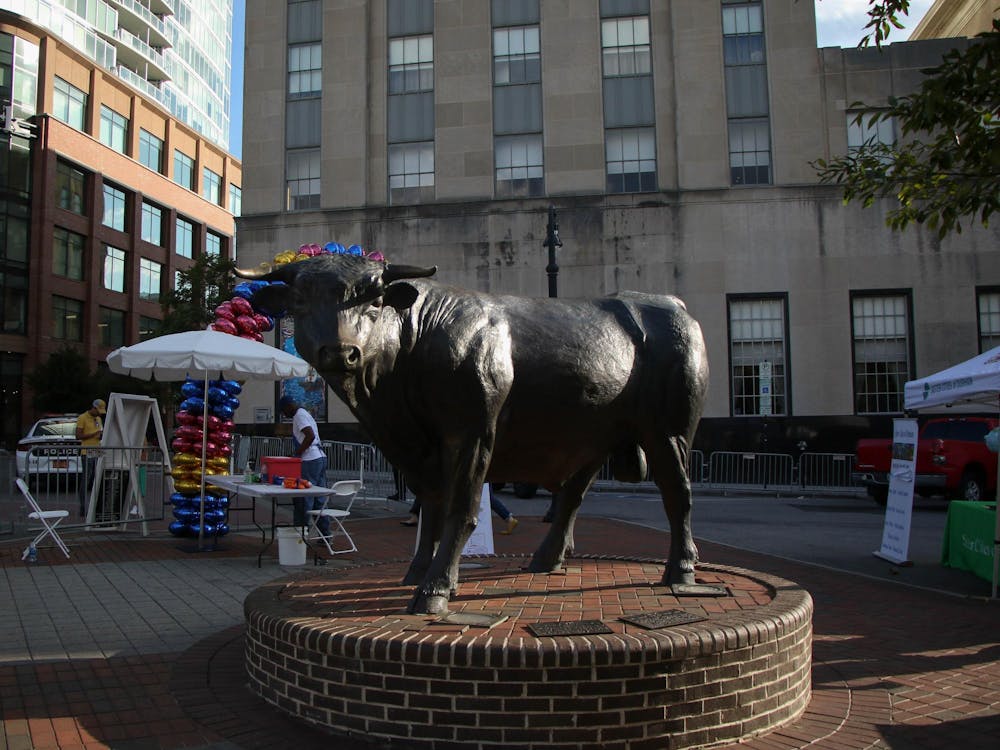Hundreds of Durham and Triangle workers and community members participated in a May Day demonstration Wednesday evening to demand a $25 minimum wage, affordable housing, a cease-fire in Gaza and that Duke pay its fair share in taxes.
May Day, which falls annually on May 1, is observed around the world to celebrate workers’ rights. The Durham rally was organized by the Southern Workers Assembly and garnered the attention of union organizations, public school staff and sanitation workers, among other local workers through a Wednesday Instagram post.
Protesters gathered at 5 p.m. at CCB Plaza in downtown Durham before marching down Main Street. They later circled back to the Plaza at 8 p.m.
The protesters encountered law enforcement officers as they neared East Campus, with police officers and vehicles stationed at the University’s entrance.
Protesters chanted “Free Palestine” and demanded that Duke disclose and divest its holdings in Israel. Workers held posters and banners with the words “$25/hour now,” “Aboli$h the Oligarchy” and “Fund the People, not Genocide.”
Harper Houston, a member of the Revolutionary Communists of America who accompanied workers in the protest, noted that “the atmosphere was powerful.” Houston was inspired by how the demonstration brought together various issues of labor rights, affordable housing and divestment from Israel.
“I feel like I'm glowing because I saw such diversity in the crowd and the organizers, so many different cross sections of our community coming together in solidarity, not only to fight for each other and the oppressions that we face here at home, but the oppressions that people face around the world,” Houston said.
For Houston, May Day celebrates the historic struggle of workers and unions for labor rights and equality. Houston believes that the fight for the working class is especially relevant in a state like North Carolina, characterizing it as “one of the worst in the country for workers rights.”
As a right-to-work state, North Carolina does not require newly hired workers to join any labor unions. This means that when a majority of workers at a company vote to unionize, only those who voted become union members. Limited union membership and financial instability have hindered collective bargaining power in North Carolina.
Shamere Stubbs, a restaurant employee, joined the protest to express his dissatisfaction with his wage, which he said has made it challenging for him to afford housing. Stubbs said he was recently laid off by California Pizza Kitchen and expressed his frustration having to work from 10 a.m. to 11 p.m. to make ends meet.
Demonstrators also demanded that Duke contribute funds to the city for increased worker wages.
In an endorsement and interest form sponsored by the SWA, the organizers claimed that the University has not paid its fair share of property taxes in the city despite its $12 billion endowment. The form then called on the University to allocate at least $20 million annually to support wages for local workers and provide affordable housing and other public services.
“The labor movement here and Durham is asking for Duke to pay their taxes and contribute back to the community because they do not,” Houston said.
In response to past concerns of its exemption from paying property taxes, the University has cited its voluntary contributions to local civic projects and leases of its commercial office space for non-profit activities.
While Stubbs identified with the goals of the demonstration, he felt that too few people were aware the protest was happening. He suggested handing out flyers to Walmart, Target and local restaurants to gain firsthand insight into the workers’ struggles and demands.
Austin Hicks works at The Streets at Southpoint and is a member at the Freedom Road Socialist Organization. He joined the protest because he believed it was the first step towards fostering a community of workers. For him, although the march is just a “minor disruption,” building connections between workers can promote a long-term movement.
“I came out here today because I strongly believe in the after party where we all talk and we all get organized and we all get connected,” Hicks said. “ … so that we can really build community one by one, block by block, worker by worker, building by building [and] business by business.”
Get The Chronicle straight to your inbox
Signup for our weekly newsletter. Cancel at any time.
Lucas Lin is a Trinity sophomore and a university news editor of The Chronicle's 120th volume.

